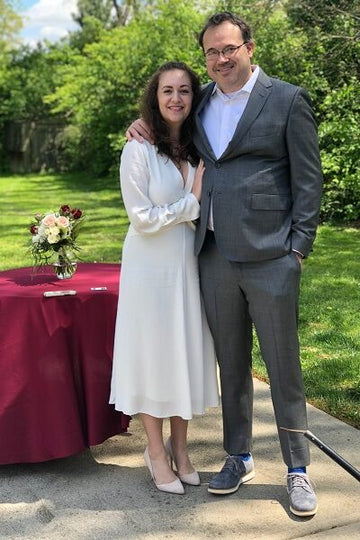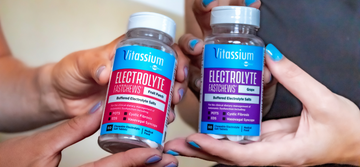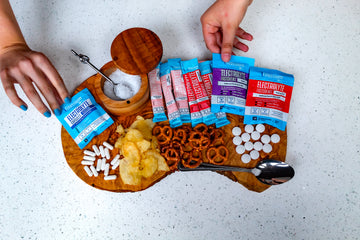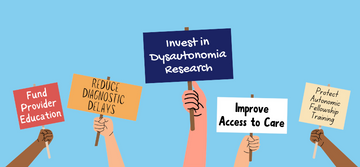‘I GOT POTS AFTER CONTRACTING COVID-19 SYMPTOMS. HERE’S HOW IT’S CHANGED MY LIFE.’
Nov 04, 2020

Several months after their initial infection, some COVID-19 patients continue to struggle with fatigue, trouble breathing, exercise intolerance, gastrointestinal issues and cognitive difficulties (or “brain fog”). By some estimates, as many as 5% to 15% of COVID-19 patients—termed “long haulers”—can experience these long-lasting symptoms, and around 80% of them are women.
Physicians are still examining what can cause this condition, although several theories exist. One potential answer is dysautonomia, which is a medical term that represents a malfunction of the Autonomic Nervous System. Dysautonomia can be triggered by viruses as well as other medical events, such as strokes and heart attacks, and emotional traumas.
In situations like this, personal stories can often help increase awareness. Recently, we spoke with Amanda, who was kind enough to share her experience with us. Below you can find our conversation, edited lightly for clarity.
Can you describe your journey from COVID-19 to where you are today?
In late February of this year, my husband got very sick after traveling for work. He was in and out of the airport in February. He had a very high fever and complained of not being able to breathe. About four days after he got sick, I got sick. We both went to the ER because our doctors refused to see us in early March because of fears related to the novel coronavirus.
The ER tested us for all strands of the flu and strep, and they were all negative. They refused to test us for COVID-19, because they did not have enough tests. At the time, the U.S. Centers for Disease Control & Prevention (CDC) only recommended testing for people who had been to China or Italy.
The next day, I lost my sense of smell and taste, which was a very odd sensation. For the next couple of weeks, I suffered from heavy fatigue, trouble breathing and fever. At the end of March, I unfortunately was developing new symptoms that were very strange—tachycardia, passing out when I stood up, allergies to foods I had always ate and strong aversion to any smells. After I gained my sense of smell back, it seemed that all smells were just too strong, especially anything that contained a synthetic fragrance.
I was very worried about the tachycardia I was experiencing and being unable to stand up without passing out. I also seemed to be having severe dehydration, even though I drank a lot of water. My primary care doctor sent me for blood work, and it indicated my sodium levels were too low. But this doctor did not know what was wrong with me and suggested everything was in my head. I spoke to my mom, a Nurse Practitioner, about my symptoms and she diagnosed me with POTS (postural orthostatic tachycardia syndrome). She informed me to contact a local cardiologist to see if I could get an appointment.
It took a few months before nonessential visits were allowed again, but when my state opened back up in May, I was took a Tilt Table test and was diagnosed with POTS. My cardiologist believes that I had an autoimmune response to the virus and developed POTS from it.
Being diagnosed with POTS completely changed my lifestyle. I felt very depressed after the diagnosis. But I knew I could not give up. I have two dogs that need me. And Gomer, my five-year-old Anatolian Shepherd, just cannot live without me.
I started eating healthy—only whole foods with no preservatives. I also put myself on an anti-inflammatory diet because I was experiencing inflammation and severe neuropathy. I started to exercise, even though I was still fatigued from having COVID-19 symptoms. My cardiologist recommended I start increasing the salt intake in my diet because of my POTS diagnosis. My mom is a professor at a local university and put me in touch with one of her former students who was also diagnosed with POTS a few years back, so I could talk with her.
My mom’s former student told me about SaltStick and how it has changed her life. I ordered a few bottles and was very surprised how much it helped me. After taking SaltStick Vitassium, I felt so much better. Since I was eating healthier, it was hard to get enough sodium in my diet that I needed because I was not eating processed food anymore, which usually has high sodium levels. With the SaltStick Vitassium, I instantly felt better, and my dehydration went away. I no longer was waking up at 3 a.m. thirsty for water, which I did for weeks in March and April after COVID-19 symptoms.
How has your condition evolved over time? How does it impact your daily life today?
Unfortunately, I still have symptoms of POTS but not as severe. I am able to walk my dogs and go to the store without being scared if I will pass out. I always drink a full glass of water and take at least two SaltStick Vitassium capsules before leaving the house so I know I will not get dehydrated when I am out.
Can you describe the diagnosis process?
It was a terrible process. If my mom had not diagnosed me and told me who to contact, I don’t know if I would have had a diagnosis now. A general practitioner is the gatekeeper to all specialists and if they don’t believe you, then you don’t get help. I now have a new primary care doctor.
What do you do day to day to manage symptoms?
Each day, I drink a lot of water and take about 10 capsules of SaltStick Vitassium throughout the day, and I feel so much better after taking SaltStick.
If I don’t take SaltStick right away, I can feel that I am dehydrated. I also take midodrine that has been prescribed by my cardiologist to increase my blood pressure.
How has SaltStick fit into the picture?
SaltStick has been a game changer. It seems there is no product out there like this. I now have allergic reactions to many fillers in supplements and vitamins but I have no reaction to SaltStick. It has clean ingredients, and I really like that. It only has what I need and nothing more.
What would you say to someone else in your shoes, who is going through a similar journey?
Don’t give up. Be an advocate for yourself so you get the care you need. It is hard some days to be strong and to keep advocating for myself. Some days I just feel so fatigued and tired of fighting, but I keep going somehow. I am not giving up until I am completely better.
Conclusion
Doctors are still examining whether COVID-19 can cause dysautonomia, but if you have been struggling with long-term symptoms that include lightheadedness, fatigue and abnormal heart rate, it’s important to speak with a physician to see if dysautonomia could be the cause. You can also learn more about dysautonomia from Dysautonomia International.
Disclaimer: Contact your physician before starting any exercise program or if you are taking any medication. Individuals with high blood pressure should also consult their physician prior to taking an electrolyte supplement. Overdose of electrolytes is possible, with symptoms such as vomiting and feeling ill, and care should be taken not to overdose on any electrolyte supplement.







